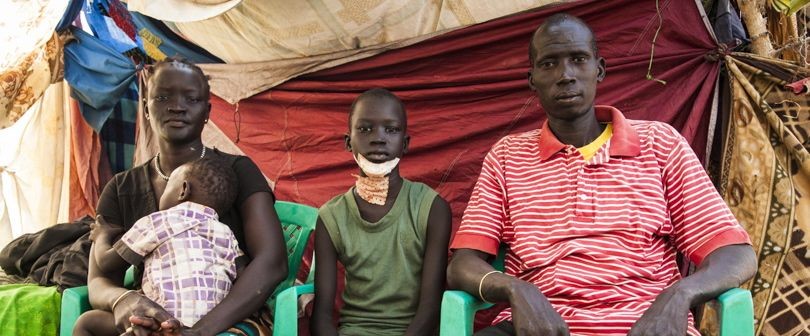About 17,000 South Sudanese have sought refuge in the UN Tong Ping camp in the capital Juba as a result of fighting within the city. Most have stayed more than a month crowded among broken-down UN cargo trucks or looking for a bit of shade under a sheet of plastic.
When they venture even just outside the camp the displaced cannot be sure of their safety. The 28-year old Martha is one of the many in the camp who goes out daily a few meters from the fence to sell water to support her five children. According to her, almost every day government forces in pickup trucks ride by on the road 20 meters outside the camp. They stop and shoot at groups of people.
In one incident four days ago, she recalls, “A pickup came with ten soldiers from the direction of the military headquarters. They stopped and began to shoot, just like that. I dived to the ground behind my water can and then ran into the camp.” She explains that three civilians were wounded, one of whom died. Also a Rwandan peacekeeper was wounded.
The fighting that broke out on 15 December in South Sudan is the result of a political struggle between President Salva Kiir and former Vice President Riek Machar, but the political struggle has also heightened ethnic tensions. Juba remains under the control of President Kiir, whose troops are spreading fear among the Nuer in the capital, while in some other parts of the country the troops of Machar have control and have attacked Dinka civilians.
The 29-year old Thomas confirmed the story of Martha. He normally bathes outside the camp because there’s too little water inside. “They – the SPLA soldiers – come almost every day about 2:00 and spray bullets at the people.”
Two Rwandan UN soldiers stand in the full sun along the road to protect civilians against attacks from outside the camp. Somewhat farther along sit another three under the shade of a makeshift shelter. One of them is Lieutenant Twagira. He says that the SPLA just want to solve conflicts between civilians and do police work. “Sometimes they shoot into the air – it could be that other times they aim at the civilians… but every country has its own standards,” he says.
The lieutenant says he’s not aware that one of his colleagues was wounded recently. According to Martha and Thomas, the UN soldiers don’t make any effort at all to stop the soldiers from shooting at civilians.
Neither is it safe inside the camp itself. The 14-year old Doctor Keah was walking through the gate of the camp one afternoon two weeks ago with his wheelbarrow filled with water containers when he heard gunshots. A bullet hit him in the back and came out through his throat. It felt like an electric shock. As he lay bleeding on the ground, a second bullet tore away part of his chin. Later he learnt that he was the victim of soldiers who were shooting onto the camp from a building nearby aiming for a deserting general who was seeking refuge inside the camp.
Again on Friday afternoon around 4:00, four more people were shot and wounded. Their condition is unclear. UN Spokesperson Ariane Quentier says that she will try to find out what happened, but she also noted that the reported incident occurred outside the camp. Her colleague Edward Kargo says he’s not aware of any of the other mentioned incidents. The UN refused access to the hospital where the victims were being treated.
By Klaas van Dijken. This article was originally published by the Dutch national newspaper Trouw on Saturday, 18 January 2014. Translation by Radio Tamazuj.
Photo: Doctor Keah, age 14, (center), sits with his parents in the UNMISS compound where 17,459 people of the Nuer tribe are seeking refuge in Tong Ping, Juba, South Sudan, 17 January 2014. Doctor Keah was shot twice by the government forces while he was collecting water inside the IDP camp (Adriane Ohanesian)




